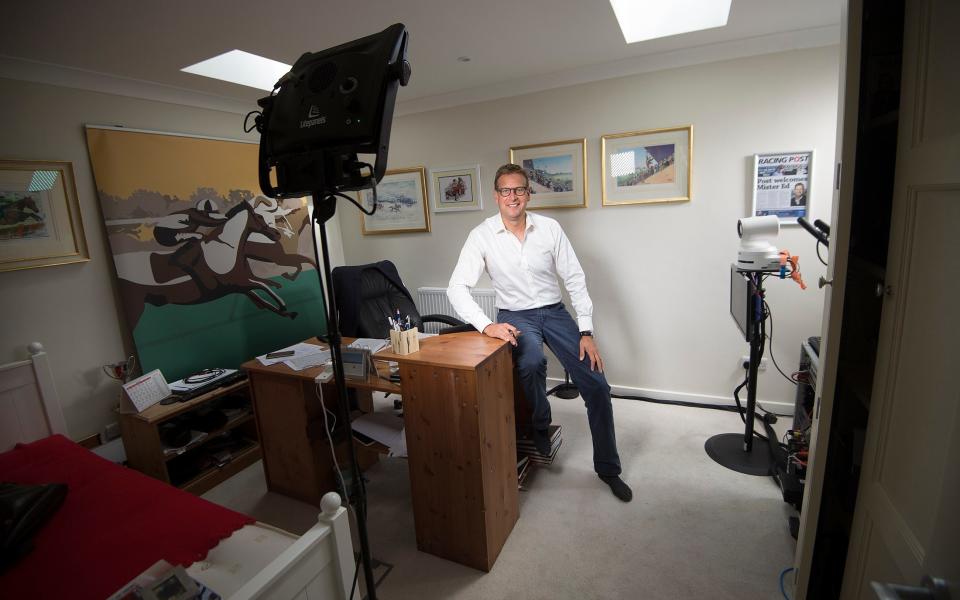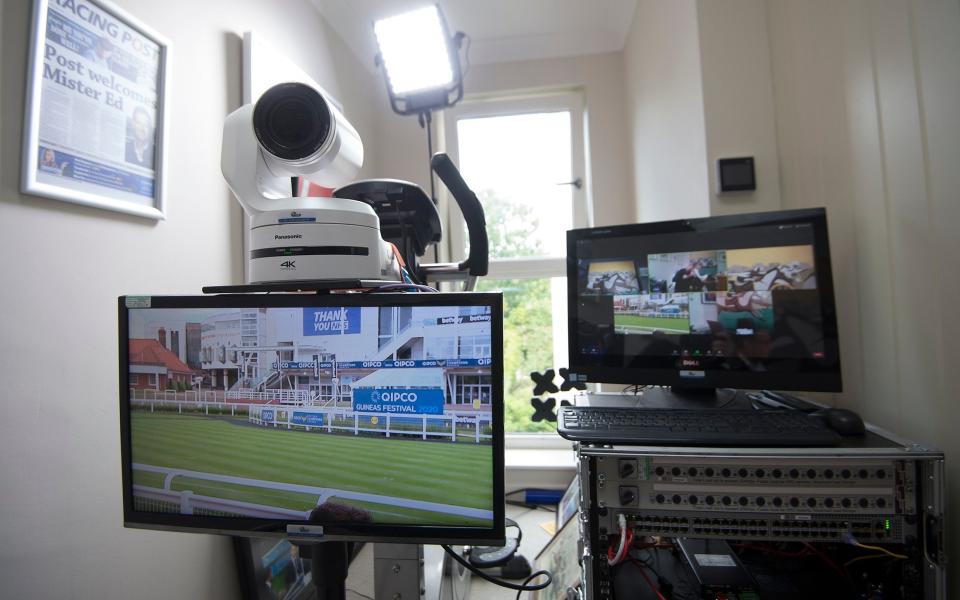Behind the scenes with Ed Chamberlin - how ITV Racing presenter hosts from his spare bedroom

“It’s been a while, good to see you.” And so Ed Chamberlin welcomed the ITV television audience back to live racing, more than two months after his last broadcast.
Bringing us seven races from Newmarket and Lingfield, including the Group One Coronation Cup, after the longest peacetime hiatus in the sport's history, he was once more where he loves to be: at the heart of the racing action.
Well, not quite. The irony was that the man presenting the return of live sport to our screens was actually working from home.
Instead of broadcasting from the paddock at Newmarket, surrounded by the bustle of race day, he was in the spare bedroom of his house in Hampshire, the hastily hung ITV Racing back drop covering the picture on the wall of his sporting hero Matt Le Tissier.
His gym bike had been pushed to one side to accommodate a host of hi-tech gizmos which had been wired up by an ITV engineer last month; up-to-the-second communications devices had been installed; the flourish of 4G masts erected round the place enough to provoke a David Icke conspiracy theory.
“Right,” he said, half an hour before he was due on air, as the man from Telegraph Sport watched on from a good two-metre gap. “All I have to do is switch that switch on there, that switch on there, log in to Zoom and turn on that light and that’s it. Or at least I hope it is. Actually, I have absolutely no idea how any of this works.”

Live racing has returned behind closed doors with no public in attendance and under the strictest of protocol. Social distancing is a priority at the courses. Jockeys wear face masks, the number of stall handlers is reduced, and media attendance is very limited.
Only one broadcast representative is allowed at any meeting, and in this case ITV had dispatched to Newmarket the trackside reporter Rishi Persad. All the other pundits, commentators and analysts were working from their front rooms, linked via Zoom. In normal circumstances, Chamberlin would have been surrounded by a plethora of staff to ensure everything went smoothly. Instead he was home alone.
“This is far more nerve-wracking than a normal show,” he admitted. “All the things you take for granted you are suddenly aware of. Normally I’m the most spoiled so and so, constantly being asked whether I want cups of tea, sweets, I've got someone applying make-up to make sure my forehead is not reflecting the lights. Now I’m completely on my own.”
And, as he sat at his desk surrounded by papers, notes and iPads, he discovered that the technology brought significant new issues. Not least the fact that when he spoke to the camera, the pictures on the screen in front of him, the ones being broadcast out to the nation, were several seconds behind him.
“The real heroine in all this is [production assistant] Vicky Andrews, who counts me in to everything through my ear piece,” he explained. “She has to deal with hardest technological aspect of all this, because everything is out of sync. There’s a four-second delay for me. When she counts me down to an ad break, she has to take into account I'm ahead of what she's seeing. All the timings are awry. I don’t know how she’s doing it. But I know she’ll get it right.”
Royal Ascot isn't too far away 🙌
16 June - 20th June on @ITV
Here's how the team have been preparing on Zoom 😆#ITVRacing pic.twitter.com/6piz9fx59D— ITV Racing (@itvracing) June 5, 2020
Hours of rehearsal had taken place before the big return, for some of which Chamberlin had forgotten to switch on his lighting system. But it did allow the participants to get used to the fact they were operating as if in a pandemic version of time travel.
“Normally everyone is in the same place, so conversation is easy,” said Chamberlin. “Now you say something and you wonder if the person you are speaking to has heard you because there’s no reaction for four seconds. Make a joke, nobody laughs: it's not good for the ego.”
Plus, he added, it was important not to dwell on what would have gone on in the days before the pandemic.
“We’re focussing on what we can do, not what we can’t. Things are going to go wrong. We’re all learning. I genuinely have no idea what is going to happen.”
As it happened, nothing went wrong. From the moment Chamberlin opened up proceedings, the afternoon ran with a smooth efficiency that belied the fact the man in charge was - by his own admission - winging it. Smooth, confident, controlled, the most important thing, however, was his tone. This was a presenter making it constantly clear sport was returning in the most difficult of times.

“I’ve got to be sensitive," he explained, during a commercial break. "There will be people watching who have suffered: they may have lost their job, lost a loved one, who knows. I can’t be too celebratory, throwing my arms in the air as if nothing has happened.” He also was required to navigate his way past those who have blamed the sport for the accelerated spread of Covid, after the Cheltenham Festival went ahead in March even as the pandemic was reaching its zenith.
“Racing as a whole had a tough time post-Cheltenham, it’s been suggested we were somehow at fault,” he said. “It’s unfair in my opinion as we were following government protocol in place at the time. But I’m aware I need to do a bit of a PR job. Especially as there could be a lot of people tuning in for the first time. What an opportunity we have to show them what a great sport this is. So I have to get it right.”
Which, over the next four hours, Chamberlin duly did. Respectful, thoughtful, knowledgeable without being pedantic, as he interviewed winning owners via Zoom and chatted with his team. Not even the nextdoor neighbour deciding this was the perfect time to start up the lawn mower seemed to perplex him.
“I’m just glad to be back,” he said. “It has been a long 10 weeks without sport.”


